Trying to lose fat but not sure whether to go with whey isolate or concentrate? You’re not alone.
With so many protein powders on the market, it’s easy to get overwhelmed—especially when every label claims to be the best for weight loss.
Here’s the truth: the type of whey you choose can actually impact your results. Whether you’re looking to burn stubborn fat, retain lean muscle, or just feel less bloated, making the right pick matters.
In this article, I’ll break down the key differences between whey isolate and concentrate—based on science and real experience from years of coaching clients through successful fat loss transformations.
Table of contents
- Quick Answer: Isolate or Concentrate for Fat Loss?
- What’s the Difference Between Whey Isolate and Concentrate?
- Calorie Comparison: Which Has Fewer Calories?
- Digestion and Absorption: Which Supports Leaner Goals?
- Training and Fat Loss: Does Type of Whey Matter?
- Budget vs Goal: Isolate Worth the Extra Cost?
- Real-Life Tips from a Fitness Coach
- Final Verdict: Best Whey for Weight Loss Goals
Quick Answer: Isolate or Concentrate for Fat Loss?

If your goal is fat loss and staying lean, whey isolate is usually the better choice.
It has fewer calories, lower carbs and fat, and absorbs faster—all of which matter when you’re in a calorie deficit.
That said, whey concentrate can still work well for many people, especially if you’re not lactose-sensitive and you’re watching your total intake closely.
When I’m cutting or helping a client shred fat, I almost always lean toward isolate—unless budget is tight or there’s no issue with bloating or extra calories.
Want more guidance on how different proteins stack up?
Check this breakdown: EAAs vs BCAAs vs Protein
What’s the Difference Between Whey Isolate and Concentrate?

Both come from the same source—milk—but they’re processed differently.
Whey concentrate contains around 70–80% protein, plus a bit more lactose, carbs, and fats.
Whey isolate, on the other hand, is more refined. It typically offers 90%+ protein and is nearly lactose-free, making it easier on digestion.
During one of my own cutting phases, I started with concentrate, thinking it would be enough.
But after a few weeks, I felt bloated and sluggish. Switching to isolate instantly made my digestion smoother and helped me feel lighter after meals.
For more info on daily whey protein use, check out:
Is Whey Protein Safe for Daily Use?
Calorie Comparison: Which Has Fewer Calories?
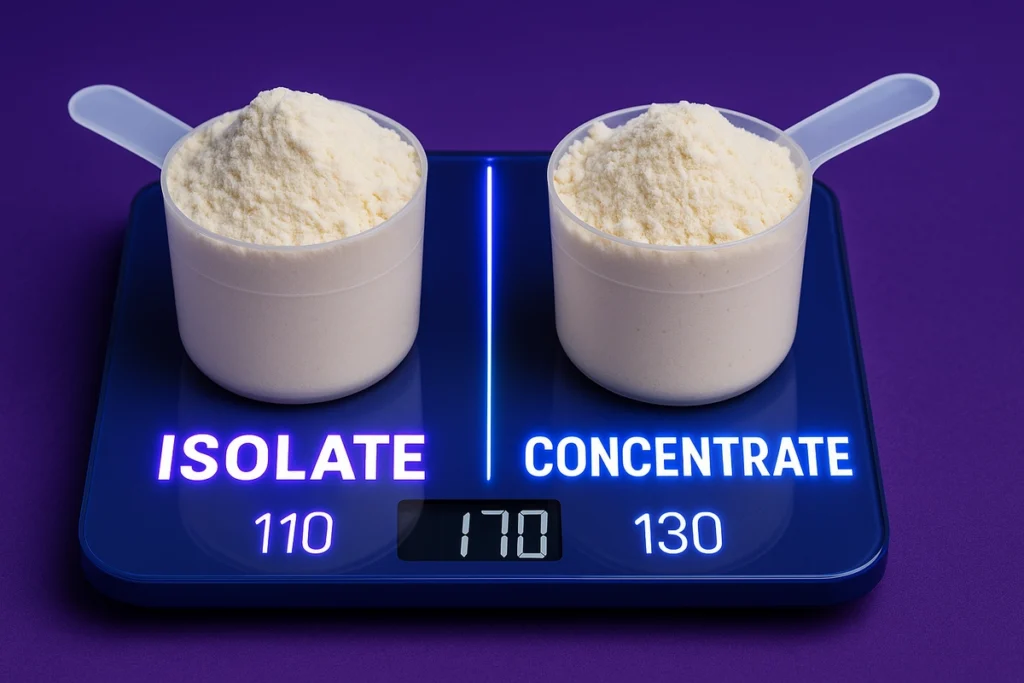
This one’s easy—whey isolate wins.
Isolate usually has 10–30 fewer calories per scoop compared to concentrate.
It may not sound like much, but over time, it adds up. In a strict calorie deficit, every bit counts.
One of my clients, James, prepping for a photoshoot, saved about 210 calories a week just by switching to isolate.
That small change helped him push past his plateau without altering the rest of his meal plan.
If you’re skinny and trying to choose smart supplements for better body composition, check this out:
Best Whey Protein for Skinny Guys
Digestion and Absorption: Which Supports Leaner Goals?

Whey isolate absorbs faster, making it a great option post-workout when you want quick recovery without a heavy feeling.
It’s also almost lactose-free, so it’s less likely to cause bloating or gas.
This was exactly the issue for Lena, one of my clients from Sweden. She had constant stomach discomfort after her shakes—until we made the switch to isolate.
She instantly felt better and stuck to her plan more easily.
Worried about long-term side effects? You might want to read this:
Does Whey Protein Harm the Kidneys?
Training and Fat Loss: Does Type of Whey Matter?
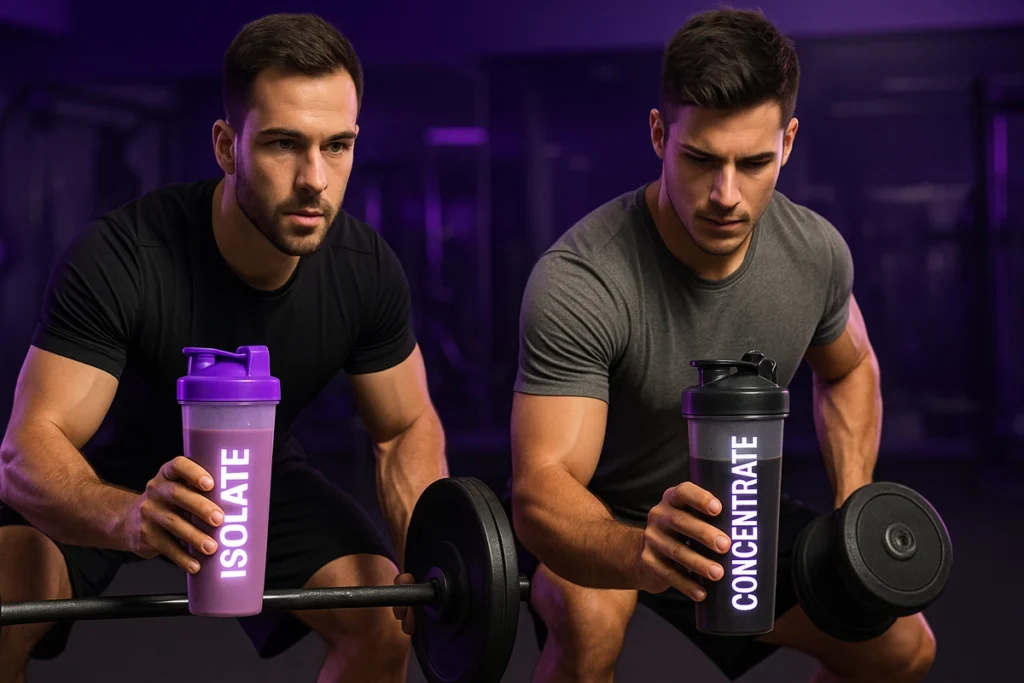
It does—especially when you’re trying to retain muscle while losing fat.
Both isolate and concentrate help with muscle recovery and protein synthesis,
but isolate gives you more pure protein per scoop with fewer distractions (like carbs or fats).
When Carlos from Brazil hit a fat loss wall before a beach trip, I suggested switching from concentrate to isolate.
With that and tighter macro tracking, he dropped from 14% to 12.2% body fat in just 2.5 weeks.
Get the most out of your training with protein timing tips here:
Whey Protein Before or After Workout?
Budget vs Goal: Isolate Worth the Extra Cost?
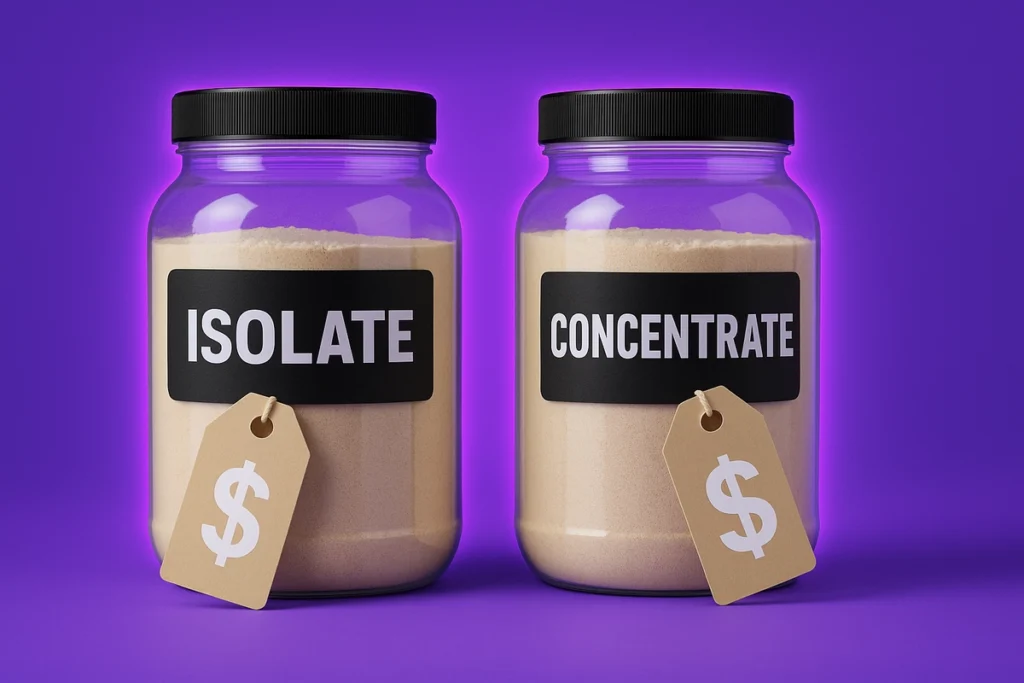
Isolate is more expensive, no doubt.
But if your gut is sensitive or you’re really focused on every macro, it’s worth it.
That said, I’ve had clients like Jake, a college student, do just fine on concentrate— as long as their overall diet is clean.
For many people, a quality concentrate with good protein content is enough.
I always say: if it fits your macros and doesn’t upset your stomach, go with what you can afford.
But if you’re going all in on fat loss, isolate gives you more control.
New to using protein and wondering how much to take?
Check this: Daily Whey Protein Intake for Muscle Growth
Real-Life Tips from a Fitness Coach
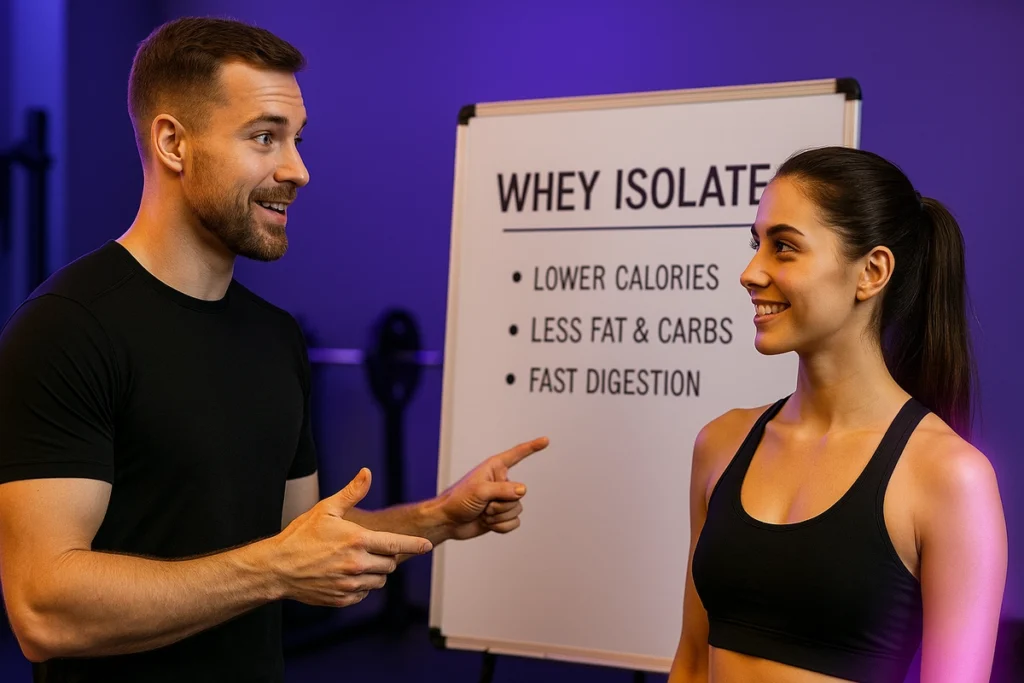
I’ve coached all kinds of clients, and I’ve made my own mistakes too. Here’s what I’ve learned:
- Don’t overdo the shakes. Jake was taking 3 scoops a day, thinking it would melt the fat.
We cut it to one post-workout shake and focused on whole foods—his results doubled. - Add fiber or healthy fats to make shakes more filling.
I often blend my isolate with flaxseed or half an avocado when I’m in a rush. - Use timing smartly. Emma, one of my clients from Australia, felt fuller and more energized after shifting her shake to post-workout instead of late night.
Also wondering if whey helps even without workouts?
Here’s the full breakdown: Whey Protein Without Working Out
Final Verdict: Best Whey for Weight Loss Goals
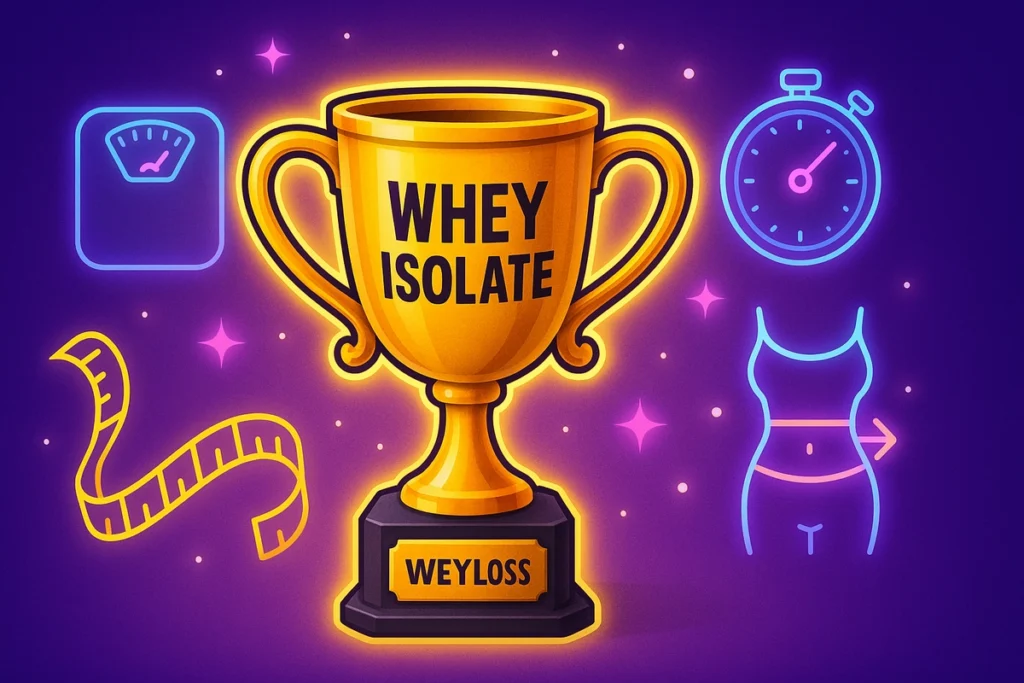
If you’re cutting, chasing definition, or sensitive to digestion, whey isolate is the winner.
It’s leaner, faster-absorbing, and easier on the gut—perfect for staying sharp in a calorie deficit.
But don’t rule out whey concentrate.
If you’re not lactose-sensitive and want a cost-effective solution, a high-quality concentrate still delivers great results—
as long as your overall plan is on point.
At the end of the day, your consistency matters more than your scoop.
Just make sure you’re using whey protein as a tool, not a shortcut.
If your goal shifts toward muscle building or bulking, compare your options here:
Mass Gainer vs Whey Protein: Which Builds Better Bulk?

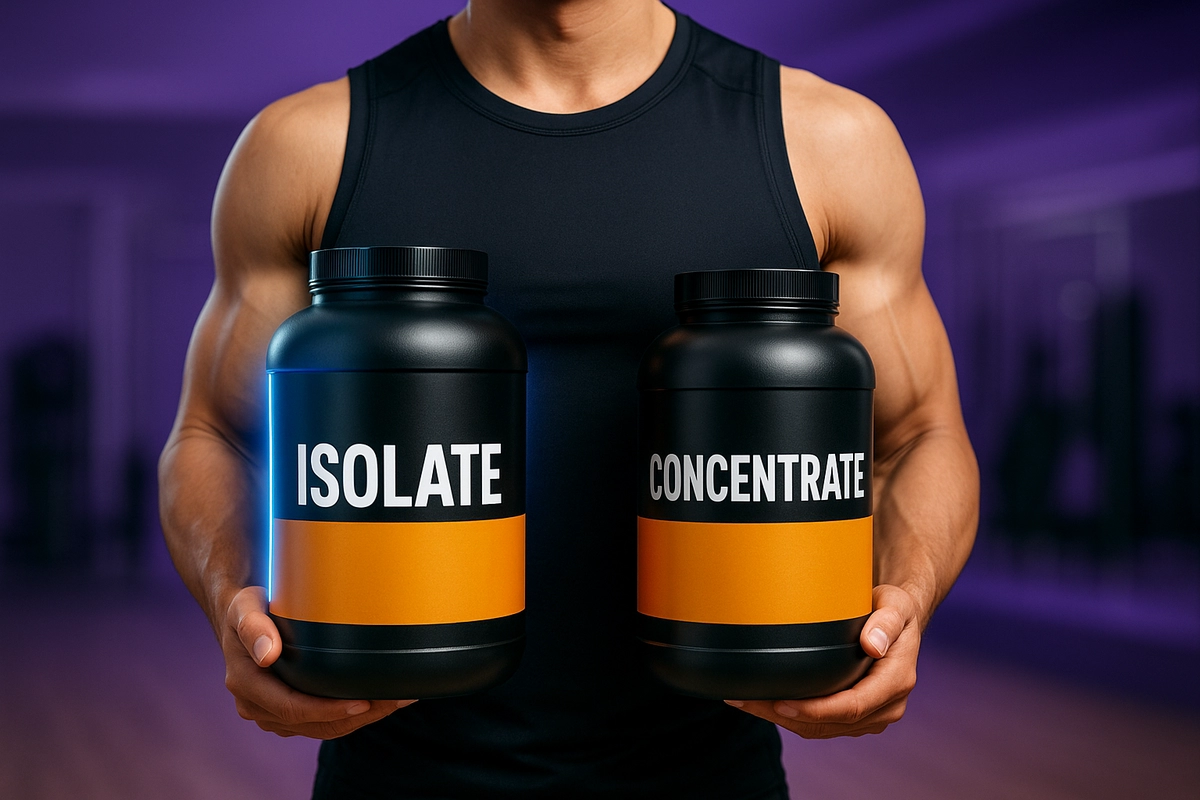

Leave a Reply